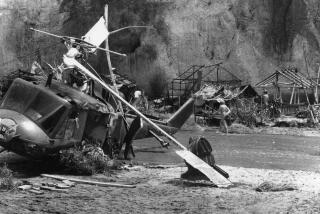D.A. May Call 3 Directors for ‘Twilight Zone’ Trial
- Share via
Three Hollywood directors are among the more than 150 potential prosecution witnesses in the “Twilight Zone” movie manslaughter trial, attorneys confirmed Monday.
John Milius, Jackie Cooper and Richard Brooks have been interviewed by the prosecution in preparation for being called to the stand on issues involving film industry standards and practices.
Deputy Dist. Atty. Lea Purwin D’Agostino, who is prosecuting director John Landis and four associates in the trial scheduled to begin today, said she sought out the three directors after reading remarks they had made in various forums concerning safety and special effects practices on Hollywood film sets. If they are called to the witness stand, she said, “I believe they will be more than cooperative.”
Cooper and Milius are among the 152 potential witnesses named on a list recently provided to the defense by D’Agostino. The list was released to the media by defense lawyers Monday.
Two Subpoenaed
D’Agostino, acknowledging that Cooper and Milius already have been subpoenaed to testify, added that Brooks also may be called as a witness. His name apparently was omitted from the list because of an oversight.
The “Twilight Zone” trial, stemming from a fatal helicopter crash during filming of the 1982 movie that killed actor Vic Morrow and two child actors, Renee Chen, 6, and Myca Dihn, 7, is scheduled to commence today. However, testimony is not likely to begin for about a month--until after selection of a jury and rulings on key defense motions by Los Angeles Superior Court Judge Roger Boren.
The long-delayed trial had been scheduled to begin Monday, but Boren agreed to a one-day delay to afford defense attorneys time to study prosecution rebuttals to defenses motions aimed at barring key evidence and witnesses from being heard at trial.
Defense counsel Harland Braun, who represents associate producer George Folsey Jr., said he did not receive the written rebuttals until Monday morning, terming the timing a “dirty trick” by the prosecution. D’Agostino, who said she filed her papers as soon as she completed drafting them, characterized Braun’s statement as “a typical defense comment.”
Hypothetical Questions
According to D’Agostino, Milius, who has directed such films as “Red Dawn,” “Conan the Barbarian” and “Dillinger,” might be asked hypothetical questions “on how he’d shoot a certain scene.” Milius, interviewed by the prosecutor June 27, has past connections with “Twilight Zone” producer Steven Spielberg, having served as executive producer and co-writer of the film “1941,” which Spielberg directed.
Brooks might be asked “about the methods of filming scenes involving special effects,” D’Agostino said. Brooks, who directed “Cat on a Hot Tin Roof” and “In Cold Blood,” won an Oscar for the screenplay of his 1960 film, “Elmer Gantry,” which D’Agostino said included a special effects sequence in which 1,000 people escaped from a fire in a church. Nobody was injured in filming the scene, she said.
Former Testimony
Cooper, the former child acting star, testified at a 1982 legislative hearing on film safety after the “Twilight Zone” tragedy. At that time, Cooper, serving on the safety committee of the Directors Guild of America, stated that “no responsible director or production manager is out there cavalierly suggesting dangerous approaches over less risky ones regardless of the desired effect.”
Landis, special-effects coordinator Paul Stewart and helicopter pilot Dorcey A. Wingo each face three counts of manslaughter in the helicopter crash. Landis, Folsey and unit production manager Dan Allingham also are charged with two counts of manslaughter for allegedly endangering the children’s lives.
At a brief hearing Monday, Boren rejected a request that Stewart be granted a separate trial. Stewart’s attorney, Arnold L. Klein, contended that his client’s right to a fair trial could be prejudiced when the jury hears “20 or 30 so-called incriminating statements” pertaining to his co-defendants rather than to him.
More to Read
Only good movies
Get the Indie Focus newsletter, Mark Olsen's weekly guide to the world of cinema.
You may occasionally receive promotional content from the Los Angeles Times.










